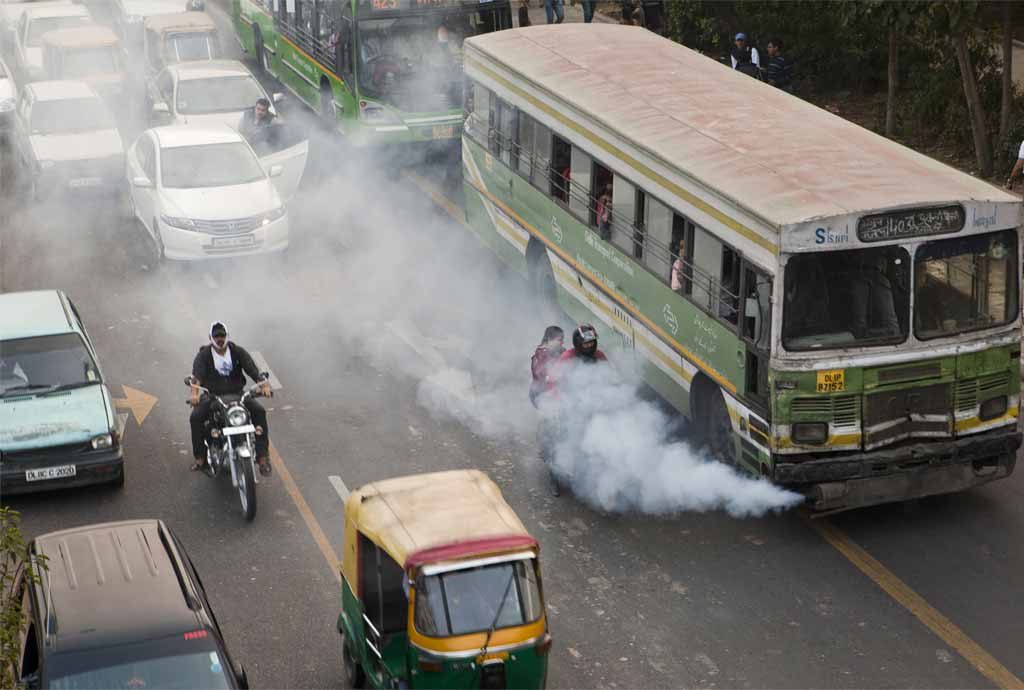With 1.4 registered vehicles in the city of Dubai, traffic congestion has gotten worse every year, despite efforts by authorities to encourage the use of public transport.
If you’re a Sharjah-resident, you’re familiar with these woes. Anything to do with traffic hits close to home and sparks up the most passionate conversations.
Recently, in Delhi, India, the government brought in measures to reign in the rising vehicular pollution levels and improve the worrying quality of air in the city. Under the ‘odd-even’ rule, private cars with odd-numbered registration plates were allowed to run on odd dates and those with even-numbered registration plates would run on even dates.
Running on a trial basis from January 1 to 15, the traffic control technique was deemed ‘a success’ by many [at leafs in terms of reduced traffic].
Have you seen: Photographs of Unseen Dubai: Bur Dubai, Deira, Karama?

Image Source: www.huffingtonpost.com
Despite car-free days declared by public campaigns [February 21 2016] in the UAE and about 1.5 million people using public transport in Dubai daily in 2015, many are still finding commuting a challenge, using their private cars.
Read about Dubai’s 2021 plans here.
So, we set out to explore what residents think of the Odd-Even rule working to decrease Dubai traffic. Here’s what they had to say:
Nilambari Datye Gokhale, an Indian residing in the UAE, considers the movement as a positive initiative if its applied in the UAE, adding that
“as the National Agenda of UAE (Vision 2012) targets for pure Air Quality Index at 90%.”
She suggested a few creative ways for UAE to develop its own odd-even formula by: implementing it once a week/month or on the day after highest record of pollution; restricting to those areas which are crowded and heavy with traffic. To further prove her view, she added that the “formula is successfully implemented in many metropolitan cities like Beijing, Paris, Mexico, Milan and Rome.”
Worth a read: Dubai Residents Comment on Appearance Judgment Culture
Umema Amjad, a student living in Sharjah supported the implementation of this strategy, which
“is bound to cut the heavy congestion in Dubai and the surrounding emirates, as well as reduce the level of air pollution.”
She further adds that the movement “will also encourage residents to use Dubai’s public transport system,” such as the RTA transport.
Raisha Hossain, a Quality and Regulatory Officer in Dubai, favored the scheme, saying that
“in addition to reduction in traffic pollution emission, the amount of traffic on the roads would partially reduce making it easy for the public to commute and reach their desired location on time.”
However, there are some UAE residents who don’t support the initiative. An American University of Sharjah graduate, Malveena Ramchandani said,
“It’s a great idea, but I don’t think it will work in the UAE, seeing how so many families have multiple cars here,” adding, “so they can easily have two cars, one with an odd and another with an even number, and switch between the two.”
In an email interview she noted it may work initially but may not be feasible in the long run. A Former Social Media Executive Radwa Hassan Eltaweel, said,
“I would love to keep moving freely with no restrictions.”
While an ambitious government in Dubai is making bold moves to reduce carbon emissions, aiming to make 50% of Dubai taxis hybrid by 2021, can this be an experiment to put stock into?
What do you think? Can the Odd-Even movement be feasible in the UAE? Discuss it with us in the comments below.
Recommended: Groove on: 6 Cafes With Live Music in Dubai








![Social alienation is a sharp tactic in the toolkit of domination [although, here it is the extension of female subordination]. Photo by Hans Van Den Berg/ flickr.com](https://b-change.me/wp-content/uploads/2018/01/1sTnAkZgJEx1Yb6fctMyVuA-570x300.jpeg)

